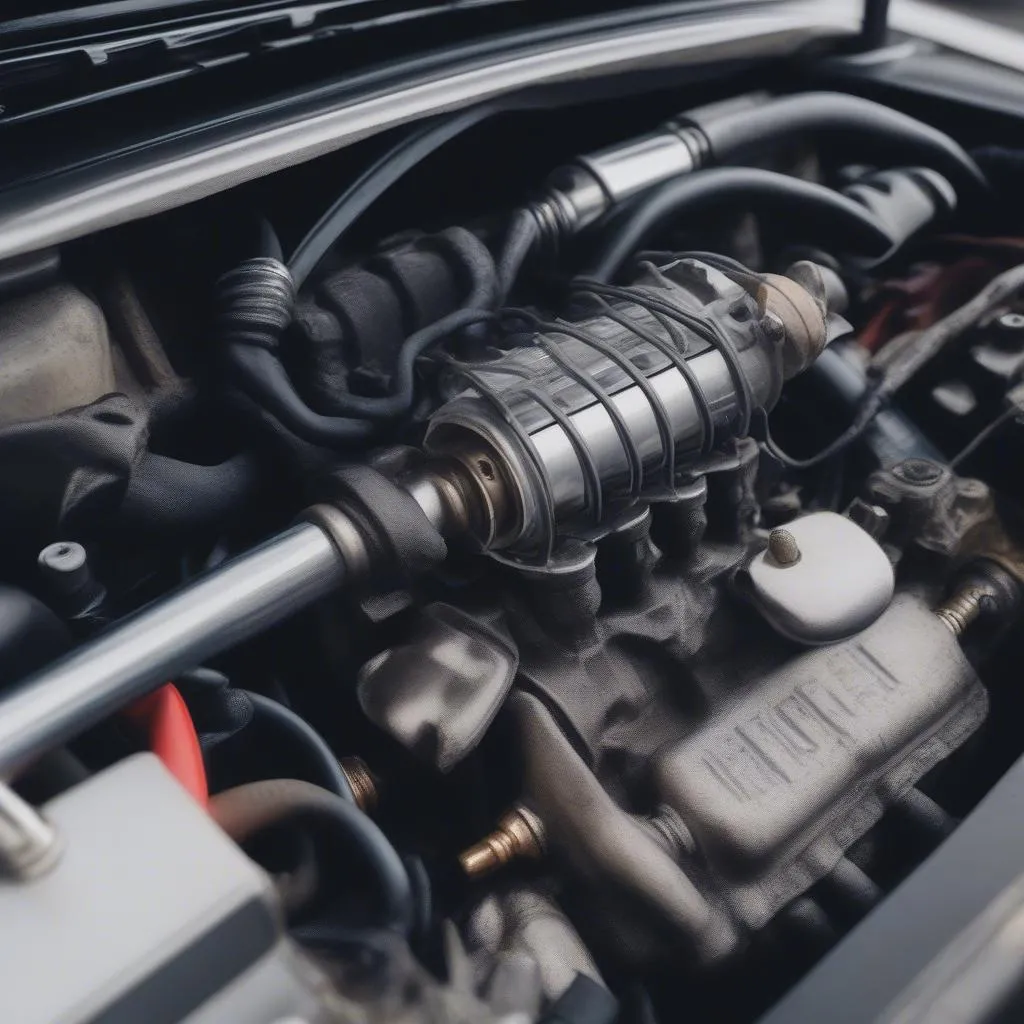“This thing won’t start again!” John muttered under his breath, staring at his 2018 Ford Mustang parked stubbornly in his driveway. He had places to be, meetings to attend, and his Mustang seemed to have other plans. Just last week, it was a sputtering engine on the I-95. Now, it was the dreaded no-start. Could it be the ignition coil this time?
As a car enthusiast, you’ve probably found yourself in a similar situation, scratching your head and wondering, “Will A Bad Ignition Coil Cause Car Not To Start?”. It’s a common question, and the answer, as with many things in the automotive world, is: it depends.
What Does an Ignition Coil Do?
Before we delve into the nitty-gritty, let’s understand the role of an ignition coil. In simple terms, this small but mighty component transforms your car battery’s low voltage into the high voltage needed to create a spark across the spark plug gap. This spark ignites the air-fuel mixture in the combustion chamber, making your engine roar to life.
So, Can a Bad Ignition Coil Leave You Stranded?
Absolutely! A faulty ignition coil can prevent your car from starting. Imagine this: the coil is like a relay runner in a race; it receives the energy (low voltage) from the battery and passes it on (high voltage) to the spark plug (the next runner). If the runner stumbles and falls, the baton (the spark) never gets passed on, and the race (your engine starting) never begins.
Symptoms of a Failing Ignition Coil
Here are some telltale signs that your ignition coil might be on its way out:
- Engine misfires: This is often the first sign. You might feel your engine jerking or sputtering, especially during acceleration.
- Rough idling: A faulty ignition coil can cause your engine to idle rough or vibrate excessively when the car is stopped.
- Check Engine Light: The dreaded “check engine” light can illuminate for various reasons, one of them being a problem with the ignition system, including the coil.
- Decreased fuel economy: A misfiring engine due to a bad coil will burn more fuel, leading to a drop in your miles per gallon.
- Car won’t start: In severe cases, a completely failed ignition coil will prevent the engine from starting altogether.
Other Culprits: Ruling out the Ignition Coil
While a faulty ignition coil is a common reason for starting issues, it’s essential to rule out other potential culprits.
- Dead battery: This is often the first thing to check. A dead battery won’t have enough juice to power the ignition system.
- Faulty starter motor: If you hear a clicking sound when you turn the key, but the engine doesn’t crank, your starter motor might be the problem.
- Fuel system issues: A lack of fuel pressure or a clogged fuel filter can also prevent the engine from starting.
 Car Engine Ignition Coil
Car Engine Ignition Coil
What to Do If You Suspect a Bad Ignition Coil
If you experience any of the symptoms mentioned above, it’s best to take your car to a qualified mechanic as soon as possible. They can diagnose the problem accurately using a dealer scanner for European cars or other suitable diagnostic tools. Based on the diagnosis, they can then replace the faulty coil or address any other underlying issue.
Remember, ignoring a potential ignition coil problem can lead to more severe engine damage down the line, potentially resulting in costly repairs.
Frequently Asked Questions
Q: Can I drive with a bad ignition coil?
A: While you might be able to drive for a short distance with a misfiring engine due to a bad coil, it’s not recommended. Driving with a misfiring engine can damage other engine components like the catalytic converter.
Q: How much does it cost to replace an ignition coil?
A: The cost of replacing an ignition coil varies depending on the make and model of your car and labor charges. However, it’s a relatively inexpensive repair compared to other engine-related issues.
Q: Can I replace an ignition coil myself?
A: Replacing an ignition coil is a relatively straightforward procedure for someone with basic mechanical skills. However, it’s always best to consult a repair manual specific to your vehicle or seek professional help if you are not comfortable working on your car.
Q: How long do ignition coils last?
A: Ignition coils typically last between 50,000 and 100,000 miles. However, factors like extreme temperatures and vibrations can shorten their lifespan.
Don’t Get Left Stranded – Seek Expert Help
Experiencing car trouble can be frustrating, especially when you’re unsure of the cause. If you suspect a bad ignition coil or any other issue with your vehicle, our team of expert mechanics is here to help. We can diagnose the problem accurately and provide reliable repair solutions.
Need immediate assistance? Contact our 24/7 support line on WhatsApp at +84767531508. We offer expert advice and assistance for all your car diagnostic tool needs.
Keep Your Engine Running Smoothly
Remember, regular car maintenance is crucial to preventing unexpected breakdowns and extending the lifespan of your vehicle. Be sure to follow your car manufacturer’s recommended maintenance schedule and address any warning signs promptly to avoid costly repairs and keep your car running smoothly for years to come.
For more insights on common car problems and their solutions, check out our articles on why your car idles fine but bogs when accelerating or what to do about car shaking after an oil change.